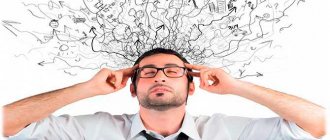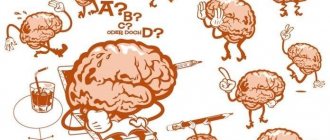05 August 2020
Dementia is a syndrome, usually chronic or progressive, in which there is a decline in cognitive function (that is, the ability to think)
Dementia is a very common cause of disability in older people. Today we will tell you what signs to suspect that your loved one is developing this disease and will dwell in more detail on the types of dementia.
Dementia causes degradation of cognitive functions (the ability to think), including memory, thinking, understanding, speech and the ability to navigate, count, learn and reason. Patients gradually cease to perform everyday activities and contact with others, suffer from confusion, anger, suspicion and attacks of aggression.
Dementia is the root cause of disability in older people, being one of the most serious diseases, both for the patient himself, for his family and for society. Alzheimer's disease is one of the most common forms of dementia.
Symptoms of dementia
The first stage often goes unnoticed: forgetfulness, loss of counting time and time, loss of orientation in familiar areas.
Middle stage: forgetfulness of events, names, names of people, disorientation, difficulties in communication, assistance in caring for oneself is needed. At this stage, changes become obvious and include walking aimlessly and repeating the same questions.
At the last stage, memory impairment progresses - loss of orientation in time and space, difficulties in recognizing relatives and friends, the person cannot take care of himself, has difficulty moving, and is aggressive.
Three stages of the disease
Dementia never occurs overnight or over a short period of time: it develops gradually, worsening in stages over several years. Three stages of development of the disease are known:
- light;
- moderate;
- heavy.
Let's talk about each of them in more detail.
Light (early)
The disease is practically invisible, the patient is no different from the healthy one. Some absurdities in the behavior of an elderly person are often associated with age-related changes and are called senile eccentricities, without particularly focusing on them. But it would be necessary.
Early stage symptoms:
- decreased performance;
- loss of interest in past interests and hobbies;
- development of excessive traditionalism;
- denial of everything new, nostalgia for the past;
- memory impairment (especially short-term);
- problems with attention: either excessive concentration, or vice versa, a serious decrease in attentiveness;
- touchiness, isolation, against this background - irritability, often turning into aggressiveness;
- restriction of physical activity.
Often, along with the listed symptoms, old people begin to confuse objects and things, lose them, forget them, put them in the most unexpected places, and then search for them for a long time and unsuccessfully. For example, after the potatoes are peeled, the knife will be put in the refrigerator, and the peeled tubers will be thrown into the trash.
At the same time, an elderly person is still adequate, can take care of himself, and is oriented in both time and space.
Moderate
The disease is gradually gaining momentum:
- Memory lapses are more frequent and more severe. But, as before, events that happened recently are forgotten, but he remembers what happened to the patient in childhood and youth in the smallest detail.
- The forgotten is replaced by something invented, imagined or imagined. Often, a pensioner’s fantasies look so believable that many believe his stories, especially since fictional events, most often, are closely intertwined with real ones that actually happened.
- Walking alone becomes dangerous for the patient: he may forget not only his address, but also the way home. There are often cases when older people manage to get lost just by turning the corner of their house.
- Patients lose control over the simplest everyday situations: they forget to turn off the kettle or, even worse, they open the gas burner, forgetting to light the gas, or they may not close the door in the apartment.
- Speech is simplified, a person conducts a dialogue with short, simple phrases such as “give me a drink”, “I won’t”, “I want to go for a walk”, etc.
- The ability to dress and put on shoes independently is gradually lost, the patient forgets how to use a knife and fork, and problems with hygiene begin.
- The character deteriorates completely, mental degradation sets in.
The physical condition of an elderly person also leaves much to be desired: the gait changes seriously, muscles weaken, hands tremble, and sometimes it is difficult for the patient to even bring a spoon or mug to his mouth.
Severe (late)
There comes complete degradation of personality and loss of all acquired skills. He cannot eat or drink on his own, any hygiene procedures are also inaccessible to him, and he does not even remember them.
An elderly person loses activity, but sometimes sharp emotional outbursts occur, dangerous both for those around him and for the patient himself. Complete social disadaptation sets in, and the person gradually fades away.
Types of dementia
The most common types of dementia are: Alzheimer's disease, vascular dementia, dementia with Lewy bodies, frontotemporal dementia, HIV-associated dementia. Dementia can occur in Parkinson's disease, Gettington's disease, progressive supranuclear palsy, Creutzfeldt-Jacobson disease and other diseases.
Some organic brain diseases, metabolic disorders (including hypothyroidism, B12 deficiency) and intoxication can provoke cognitive decline and masquerade as dementia. Depression can mimic dementia, but the two diseases often coexist, or depression can be the first manifestation of dementia.
Different types of dementia are characterized by different types of symptoms: in Alzheimer's disease, the hippocampus and entorhinal cortex are affected. These parts of the brain are associated with the formation of long-term memories, the processing of perceptions, and give us orientation in time and space. With frontotemporal dementia, a person begins to behave impulsively or speak out inappropriately and harshly, as the frontal lobe is responsible for our ability to make judgments and decisions, as well as evaluate what is acceptable in society and what is not. The temporal lobe (which also contains the hippocampus) helps process faces, sounds and scenes, and form memories.
In dementia with Lewy bodies, another part of the hippocampus is affected, and neurons that produce the neurotransmitters dopamine and acetylcholine die there. These neurons are involved in movement, vision and thinking, which is why patients with Lewy body dementia often hallucinate and have difficulty with motor skills.
Alzheimer's disease
Alzheimer's disease is characterized by a selective or lacunar type of dementia. This is an atrophic senile type of dementia, the symptoms of which appear before the age of 60. The majority of cases are observed between the ages of 65 and 75 years. Alzheimer's disease can be inherited. Risks are reduced if you study music and foreign languages from early childhood.
This type of senile dementia can develop for the following reasons:
- getting injured;
- state of oxygen starvation of the brain;
- neurotoxin poisoning.
The disease develops as a result of a biochemical disorder of glucose metabolism, which leads to the formation of plaques consisting of poorly soluble protein. These plaques, deposited in the brain, contribute to degenerative changes in nerve cells. As a result, lesions form in the cerebral cortex, which can lead to total dementia.
How quickly does dementia progress in old age? At the onset of Alzheimer's disease, memory is impaired. The elderly man is slightly absent-minded and a little forgetful, which does not attract attention at first.
The environment begins to notice changes when a person constantly forgets even recently occurring events. Although the elderly patient remembers much earlier episodes from her life very well. But later they disappear too. A patient with Alzheimer's syndrome cannot recall necessary information at the right time.
The newly received information is practically not absorbed. Elderly people have impaired spatial and temporal orientation. They often start asking questions about what day of the week, date, month, year it is. The course of the disease worsens, and the person ceases to understand where he is and does not recognize himself in the mirror. In addition, visual and hearing disturbances appear, and tactile sensitivity is impaired. Older patients cease to correctly perceive acquaintances, relatives, and home environment. In the later stages of dementia, older people cannot adequately identify their own identity.
The practical sphere of activity is gradually degrading. The process begins with the loss of complex professional skills and ends with the complete disappearance of self-service skills.
At the very beginning of the development of the disease, the elderly person is animated and fussy. Then his fussiness turns into reflexive monotonous movements. Speech is gradually reduced.
Emotionally, an Alzheimer's patient develops egocentrism, dissatisfaction with himself and his inability to overcome difficulties in professional activities and studies.
First, the elderly patient realizes that abnormal abnormalities are occurring and tries to take action. As the disease progresses, the level of self-criticism decreases. At the same time, the circle of interests of an older person narrows significantly, his judgments become more primitive. Literally before our eyes, the elderly patient degrades emotionally, turning into a very distrustful, touchy and, finally, indifferent person.
We recommend
“Products for Alzheimer’s patients: dishes, clothing, gadgets, games” Read more
Differential diagnosis
An accurate diagnosis can only be made by examining brain tissue; this is rarely possible while the patient is alive, so specialists are guided by a list of symptoms. In the process of taking an anamnesis, delirium and dementia are distinguished, and the areas of the brain in which disturbances occur are identified. First of all, the attention function is assessed; if this symptom is more pronounced than the others, a diagnosis of delirium is made, although progressive dementia can also be accompanied by a pronounced loss of attention. If a person complains of decline in memory or other cognitive functions, but these changes do not affect daily activities, it is more likely that this is also not a manifestation of dementia.
Memory impairments associated with aging are also not dementia, because if there is sufficient time to assimilate new information, the intellectual abilities of the elderly remain the same. In depression, symptoms may be similar to those of dementia, but cognitive impairment improves with treatment for depression. Elderly depressed patients show signs of cognitive decline, but unlike patients with dementia, the former tend to exaggerate memory impairment and remember important current events or personal matters.
Often, banal anemia, for example due to vitamin B12 deficiency, is confused with manifestations of dementia. Anemia may include weakness and powerlessness, pallor, loss of appetite, shortness of breath, confusion and difficulty concentrating. However, most of these symptoms are relieved by treatment of the underlying disease.
Human rights
People with dementia are often deprived of the basic rights and freedoms available to other people. In many countries, physical and chemical agents are widely used to restrain patients in nursing homes and intensive care facilities, even though regulations are in place to protect human rights to freedom and choice.
Providing high-quality care for people with dementia and their carers requires appropriate and supportive regulations, based on internationally recognized human rights standards.
Dementia treatment
Despite numerous studies and increased attention from the scientific community to this disease, there is no cure for dementia yet. Medicines are at various stages of clinical trials. It is important to diagnose the disease as early as possible, take care of the patient’s physical health, and, for prevention, train one’s cognitive abilities.
For example, in dementia due to Alzheimer's disease, cholinesterase inhibitors and memantine are used to relieve cognitive symptoms. The patient may be prescribed medications to manage behavioral or psychotic symptoms.
Research shows that the risk of disease can be reduced by exercising regularly, giving up bad habits (smoking, alcohol), controlling your weight, eating right and monitoring your blood pressure, cholesterol and blood sugar levels. Other risk factors for developing this disease include depression, low education, social isolation and lack of cognitive activity.
Back to articles
Advantages of the clinic
The Health Energy Clinic provides qualified medical care in various areas. We offer each patient:
- screening diagnostic examinations;
- targeted diagnostics using modern equipment and laboratory research;
- consultations with experienced specialists who regularly improve their skills, as well as foreign experts;
- individual selection of complex treatment;
- disease prevention activities;
- organization of sanatorium-resort treatment according to indications;
- own day hospital for course treatment.
Senile dementia turns the life of a person and his family into a real hell. Do not allow the disease to progress. Sign up your loved ones for an examination at Health Energy and let our specialists choose the most effective treatment.
WHO activities
WHO recognizes dementia as a public health priority. In May 2021, the World Health Assembly endorsed the Global Health Sector Action Plan for the Dementia Response 2017–2025. The Plan provides a comprehensive program of action for policymakers, international, regional and national partners and WHO in the following areas:
- making dementia a public health priority; raising awareness of dementia and creating dementia-friendly initiatives for people with dementia; reducing the risk of developing dementia;
- reducing the risk of developing dementia; diagnosis, treatment and care;
- dementia information systems; support for carers of people with dementia; And
- scientific research and innovation.
An international monitoring platform, the Global Observatory on Dementia, has been established for policy-makers and researchers to facilitate the monitoring and exchange of information on dementia policy, health care, epidemiology and research. WHO is also developing a knowledge sharing platform to facilitate the sharing of best practices in dementia.
WHO has developed a dementia response action plan to assist Member States in developing and operationalizing dementia action plans. This guidance is closely linked to the WHO Global Observatory on Dementia and includes relevant tools, such as a checklist, to guide the preparation, development and implementation of dementia action plans. Additionally, this guide can be helpful in identifying stakeholders and setting priorities. The WHO Guidelines for Reducing the Risk of Cognitive Impairment and Dementia provide evidence-based recommendations for interventions to reduce modifiable risk factors for dementia, such as physical inactivity and unhealthy diet, and to manage medical conditions associated with dementia, including hypertension and diabetes.
Dementia is also a priority condition in the Mental Health Gap Action Program (mhGAP), an important resource for general practitioners, especially in low- and middle-income countries, to use in providing first-line care for mental, neurological and substance use disorders.
WHO has developed iSupport, a program that provides information and skills to caregivers of people with dementia. The web-based iSupport program is available as a printed manual and is already in use in a number of countries. An online version of “iSupport” will be available soon.
Diagnosis
An accurate diagnosis, determining the type of dementia and the degree of development of the probable causes of the disease, can only be made by a doctor (neurologist or psychiatrist). To do this, data is collected on the signs and course of the disease, the patient himself, close friends and relatives living with him are interviewed. Various medical examinations are carried out: cerebral vascular examination, blood tests, MRI... The patient is tested using neuropsychological screening scales.
Types of dementia
Depending on the nature of its occurrence, two types of mental pathology are distinguished:
- congenital;
- acquired.
Congenital oligophrenia or, in other words, a non-progressive process is a pathology that occurs during the intrauterine development of the fetus or in connection with complicated labor of the mother. Its signs are observed immediately after the birth of the child. This defect in mental development is almost impossible to correct, but it seems possible to bring the intellectual development of such a person closer to established standards provided that timely and competent therapy is provided.
Acquired mental retardation is a type of pathology in which a decrease in the level of intelligence occurs during a certain period of a person’s life. Its characteristic feature is the progressive course of the disease, in which the development and increase in symptoms occurs gradually.
The following classification of mental disorder is based on the determination of the IQ, which the psychotherapist establishes using special tests. When diagnosing mental retardation in accordance with the degree of severity, experts distinguish between the following types:
- light;
- moderate (relative);
- heavy;
- deep.
A person who suffers from mild mental retardation is incapable of abstract thinking and has short-term memory. In this case, there is a violation of functional skills (for example, reading, writing, cooking, etc.). In social relationships with others, such people give the impression of being immature, so they are often subject to manipulation from the outside. When dealing with complex life issues and tasks, such a person feels the need for help.
A person with moderate dementia requires mandatory supervision. Unable to cope with everyday tasks, he needs continuous support from loved ones who are forced to carry out some of the patient’s responsibilities.
In the social sphere, the main tool of which is oral speech, the patient feels uncomfortable, his vocabulary is poor, so he often cannot correctly express his thoughts and demands. To form successful interpersonal relationships, an oligophrenic needs outside communicative assistance. In everyday, ordinary life, such people are able to develop certain skills and abilities solely as a result of persistent, long-term training.
Conceptual skills in people with severe mental retardation are limited and localized. They do not perceive the speech of others well and are not aware of such concepts as “number”, “money”, “time”, etc.
The patient's oral speech is limited and therefore consists mainly of primitive phrases and single words. Such people concentrate exclusively on what is happening around them at the moment.
A person with severe mental retardation needs to appoint a guardian who provides constant care and supervision (purchasing food and clothing, cooking, personal hygiene, etc.).
With a deep form of mental retardation, a person practically loses visual-spatial skills. For example, he can point to a certain object, but does not know how to use it for its intended purpose. The functional use of things is hampered by accompanying significant sensory and motor deviations.
The patient’s skills in terms of perceiving the speech patterns and gestures of others are very limited, which creates problems of communication in society. Such a person expresses basic desires and emotions using body language. At the same time, his consciousness is capable of perceiving only simple instructions. Such a patient is completely dependent and needs constant care.
Classification
There are 3 main variations of dementia:
- Alzheimer's. That is, when it is based on natural degenerative processes of the brain.
- Cerebrovascular. Develops against the background of exacerbation of cardiovascular diseases. In most cases, the patient had previously had a stroke or heart attack.
- Mixed type.
The clinical picture and prognosis directly depend on the nature of the damage to the brain and nerve cells.











